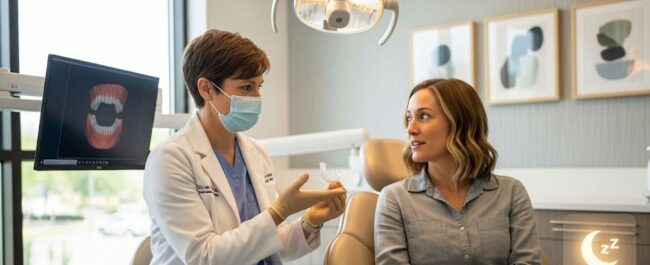The Hidden Link Between Oral Health and Sleep Apnea
Sleep apnea is often thought of as a purely medical condition — snoring, daytime fatigue, and pauses in breathing at night. Yet, your dentist may be one of the first professionals to spot the early warning signs. Emerging research shows a strong connection between oral health and sleep apnea, meaning that the state of your teeth, gums, and jaw can provide valuable clues about this potentially serious sleep disorder.
Did you know? At Reflections Dental, we can screen for sleep apnea during routine dental visits, helping protect your overall health and improve sleep quality.
How Dentists Detect Sleep Apnea
While medical doctors diagnose sleep apnea through sleep studies, dentists play a key role in early detection. During routine exams, a dentist may notice:
- Bruxism (teeth grinding or clenching): Often a response to disrupted breathing during sleep.
- Jaw pain or temporomandibular joint (TMJ) disorders: Misaligned jaw movements or tension from nightly clenching.
- Scalloped tongue or enlarged tonsils: Can indicate airway obstruction.
- Gum inflammation or dry mouth: Often from mouth breathing during sleep.
Spotting these signs early is crucial because untreated sleep apnea can increase the risk of high blood pressure, heart disease, diabetes, and impaired cognitive function. Dentists are uniquely positioned to notice these patterns long before more severe health consequences arise.
Oral Appliance Therapy: A Dentist’s Powerful Tool
For patients diagnosed with mild to moderate obstructive sleep apnea (OSA), dentists can provide oral appliance therapy (OAT). These custom devices, often called mandibular advancement devices (MADs), gently reposition the lower jaw and tongue to keep the airway open during sleep.
Benefits of oral appliance therapy include:
- Reduced snoring and nighttime interruptions
- Improved oxygen levels during sleep
- Enhanced daytime alertness and mood
- Non-invasive alternative for patients who struggle with CPAP machines
Dentists like those at Reflections Dental can design, fit, and adjust these appliances for optimal comfort and effectiveness. They also monitor oral health to ensure the device doesn’t cause bite changes or jaw discomfort over time.
Beyond Appliances: Dental Care That Supports Healthy Sleep
Even if a patient does not use an oral appliance, maintaining oral health can impact sleep quality:
- Treating gum disease: Chronic inflammation may worsen systemic inflammation associated with sleep apnea.
- Addressing missing teeth: Proper alignment helps maintain airway function and supports jaw position.
- Night guards for bruxism: Protect teeth from grinding caused by disrupted sleep.
By addressing these dental issues, patients can reduce complications related to sleep apnea and protect long-term oral and overall health.
When to Seek Help
If you experience any of the following, consider talking to both your dentist and physician:
- Loud, chronic snoring
- Pauses in breathing noticed by a partner
- Morning headaches or dry mouth
- Persistent fatigue or daytime sleepiness
- Teeth grinding or jaw pain
Early intervention is key. Dentists and sleep physicians often work together to create a comprehensive treatment plan that improves both oral health and sleep quality.
A Collaborative Approach
Managing sleep apnea is rarely a “one-size-fits-all” solution. It requires a collaborative approach between dental professionals, sleep specialists, and sometimes ENT physicians. Dentists not only help with oral appliance therapy but also monitor the oral effects of sleep apnea treatment, ensuring that improvements in sleep don’t come at the expense of dental health.
Research continues to highlight the importance of oral health in sleep medicine. A 2020 study in the Journal of Clinical Sleep Medicine found that dentists were often the first to identify patients at risk for OSA, emphasizing their vital role in early diagnosis and management.
Take the Next Step Toward Better Sleep and Dental Health
Sleep apnea doesn’t just affect your nights — it impacts your heart, brain, and overall quality of life. Routine dental visits aren’t just about keeping your smile healthy; they can be a critical checkpoint for detecting sleep disorders early. Ask about oral appliance therapy or a sleep apnea screening at your next appointment. Your teeth, jaw, and overall wellness will thank you.


